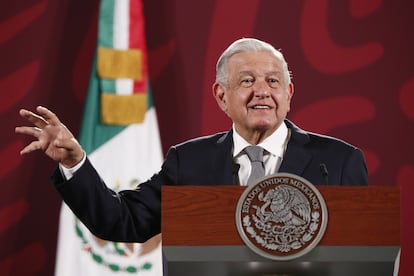Mexican president denies DEA involvement in drug lord’s capture
López Obrador acknowledged learning of Rafael Caro Quintero’s arrest after the fact and lamented the deaths of 14 marines who participated in the operation

Mexican President Andrés Manuel López Obrador has denied the participation of the United States Drug Enforcement Agency (DEA) in the capture of the highest profile drug trafficker during his administration. Rafael Caro Quintero, known as the “Narco of Narcos” in the 1980s, was a top boss in the Guadalajara cartel, which later became the Sinaloa cartel. After he was arrested in the Sinaloa (northwest Mexico) highlands, the president said, “The DEA had no direct involvement. Information was requested so that they [the DEA] could collaborate, but it didn’t happen. The Mexican Secretariat of the Navy was responsible for the entire investigation and the apprehension of Mr. Caro Quintero.”
US involvement seemed like a given, if only because of pressure from the Biden administration. Caro, a fugitive for nine years, was arrested two days after López Obrador, often referred to by the acronym AMLO, visited his counterpart in Washington, DC. The drug lord had been a prime DEA target since the brutal murder of DEA agent Kiki Camarena in 1985. He was arrested and imprisoned that same year, but was released in 2013 for dubious legal reasons with 12 years left on his sentence. The DEA never forgot or forgave his early release and raised the bounty on Caro to US$20 million, the highest reward the agency has ever offered for a fugitive.
The Mexican president acknowledged that the arrest warrant was executed without his prior consultation. “I found out after he was under arrest,” he said. “If a warrant has been issued, it has to be executed. And if it’s a routine matter, there’s no need to consult me. There is no impunity for anyone, no matter who he is.”
But the president’s account didn’t square with the DEA’s statement. “Today, our incredible DEA team in Mexico worked in partnership with Mexican authorities to capture and arrest Rafael Caro Quintero, who is charged in the United States with the torture and murder of DEA Special Agent Kiki Camarena and with many other crimes,” said the statement from DEA administrator, Anne Milgram. Ken Salazar, the US Ambassador to Mexico, said ,”Justice has no expiration date. Thanks to our Mexican partners for capturing Rafael Caro Quintero.”
“Did the DEA find him and inform the Navy?” asked a reporter during the president’s press conference. “No, no, no. Nor did they [the DEA] participate in the operation – it’s not like before. This is misinformation, but fortunately the ambassador [Salazar] clarified the situation. I believe that the DEA’s director made a statement that led to this version of the story, but the Navy admiral informed me that there no such participation [by the DEA],” claimed President López. “Sometimes [the DEA] participates – they have these information systems. And there is cooperation with the DEA when needed, but lately there hasn’t been any.”
Regarding the crash of a Mexican Navy helicopter in which 14 marines died, the president said it was returning to the airport in Los Mochis (on the Sinaloan coast) when the crash occurred. The cause of the accident remains unknown. “They were outside the area where the arrest took place. The Secretary of the Navy says that an investigation into the cause of the accident is underway. If it hasn’t been sent already, the black box will be delivered to the helicopter manufacturer for analysis.”
AMLO again said that he deeply regrets the deaths of the marines and has asked for greater compensation for their families. “Although they are irreparable losses, we are committed to supporting [the families] in every way. Every member of the armed forces has life insurance, but I issued an order for the families to be given double the amount they are entitled to by law,” he said.
Soon after Caro’s arrest, US Attorney General Merrick Garland release a statement that “immediate extradition” will be sought. Caro was transferred to Altiplano, Mexico’s maximum security prison that gained notoriety when Joaquín “Chapo” Guzmán’s escaped in 2015 through a tunnel connected to his cell. President López addressed the issue of extradition, saying that Caro is pursuing legal options for his release, and there is no progress yet on the extradition process. “We are going to make sure there is no corruption or anything that violates our laws,” promised the president.
Caro served 28 years in Mexican prisons, but 12 years before the end of his sentence, he was released in a legal scandal that the US government would never forget. In August 2013, an appeals court overturned Caro’s 40-year prison sentence for the murders of Camarena and his pilot, Alfredo Zavala. The appeals court decided that Caro’s case should have been handled by a state court, not a federal one, and ordered his immediate release from a maximum-security prison.
A few months later, Mexico’s Supreme Court overturned the appeals court’s decision on the basis that Camarena was a US government agent, so his murder was a federal crime and Caro had been properly prosecuted in a federal court. A new arrest warrant was issued for Caro, but it was too late. The drug lord had disappeared and was on the run for the next nine years.
“Do you think there is going to be a spike in violence in Sonora (northern Mexico) where he [Caro] operated?” asked a reporter at the president’s press conference. “I don’t think there will be more violence in that region,” replied the president, who went on to explain that Caro was a powerful narco in the 1980s, but most young people only remember him from the recent Netflix series, Narcos: Mexico. “Wasn’t he responsible for a lot of violence?” asked the same reporter. “We don’t know,” was the president’s terse reply.
Although he is not as powerful as he was thirty years ago, US authorities believe he is the head of a cartel that operates in the northern Mexican states of Sonora, Baja California, and Chihuahua. The US Federal Bureau of Investigation (FBI) believes that he was still involved in drug trafficking because after he managed to get a judge to release him, the first thing he did was to return to his hometown where he reorganized, negotiated a piece of the pie, and quietly took care of business without all the extravagances of the past.
Tu suscripción se está usando en otro dispositivo
¿Quieres añadir otro usuario a tu suscripción?
Si continúas leyendo en este dispositivo, no se podrá leer en el otro.
FlechaTu suscripción se está usando en otro dispositivo y solo puedes acceder a EL PAÍS desde un dispositivo a la vez.
Si quieres compartir tu cuenta, cambia tu suscripción a la modalidad Premium, así podrás añadir otro usuario. Cada uno accederá con su propia cuenta de email, lo que os permitirá personalizar vuestra experiencia en EL PAÍS.
¿Tienes una suscripción de empresa? Accede aquí para contratar más cuentas.
En el caso de no saber quién está usando tu cuenta, te recomendamos cambiar tu contraseña aquí.
Si decides continuar compartiendo tu cuenta, este mensaje se mostrará en tu dispositivo y en el de la otra persona que está usando tu cuenta de forma indefinida, afectando a tu experiencia de lectura. Puedes consultar aquí los términos y condiciones de la suscripción digital.









































